Flores La Conchita was founded in 1967 and placed itself as one of the first cut flower exporters of carnations. Nowadays, the company exports alstroemerias, white callas, hydrangeas, ranunculus and recently revived its carnation program. "It will open up the Asian market for us," says Tatiana de Germán-Ribón, who took the reins of the Colombian company right when the pandemic hit, succeeding her father, Luis Martin de Germán-Ribón, who ran it for more than 50 years.
"I took on the role that I was preparing myself for, but maybe it took a little faster turn during the pandemic," continues the 36-year-old manager, who has recently also been nominated for the AIPH Grower of the Year Award. "One of the things I have focused on in the past two years has been trying to gain in-time information because I believe the world is changing very quickly, and we have to make faster decisions to stay ahead of the curve. What we know and see as a reality today may not be true a month from now."
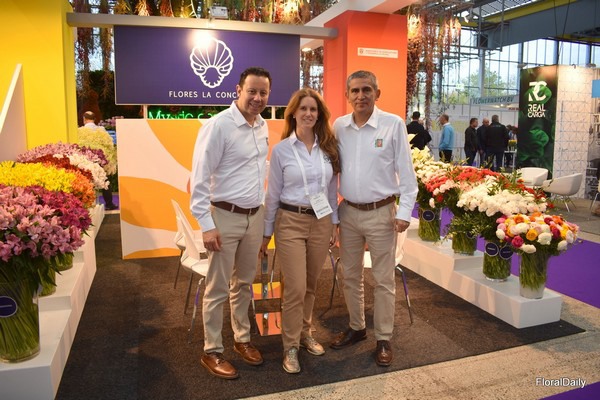
Tatiana de Germán-Ribón (in the middle) with Alain Jimenez (left ) and Sergio Illescas Jijón (right) of Floreloy, sister company of Flores La Conchita in Ecuador at the IFTF in Vijfhuizen.
A look at the company and the market situation
"Unpredictability is the new normal" is also how de Germán-Ribón explained how she sees the floral business sector in the future, quoting an article from The Economist. "For a business to thrive, it needs to have up-to-date and easily accessible information. This way, the company is prepared to make decisions. You will never have full information at hand, but at least with 75 - 80% of that information, you can be able to make quick decisions and attack anything that comes your way. Trying to get information up to date on a daily basis is what I have been trying to do in the last two and half years."
During the last year of her tenure, sales increased by 17%. The third-generation general manager is bringing a burst of new energy to the family business, supported by her MBA studies at Wharton University. "My grandfather started this business. My dad ran and grew it for most of its existence. And now, I have very big shoes to fill and challenges to face as I look to the future and continue the family legacy. Today, Flores la Conchita is the oldest cut flower company in Colombia.
"Flores la Conchita has always concentrated on high quality, but in the past few years, the company has focused as well on the growing and developing new products like ranunculus and now carnations. Next year, it will focus more on sales, marketing, and new markets because it's going to be a challenging year, given the economic forecasts. Like us, a lot of farms have grown, so there are also more flowers on offer. Even if the demand stays the same in our luxury bracket, it's going to be a little bit more competitive."
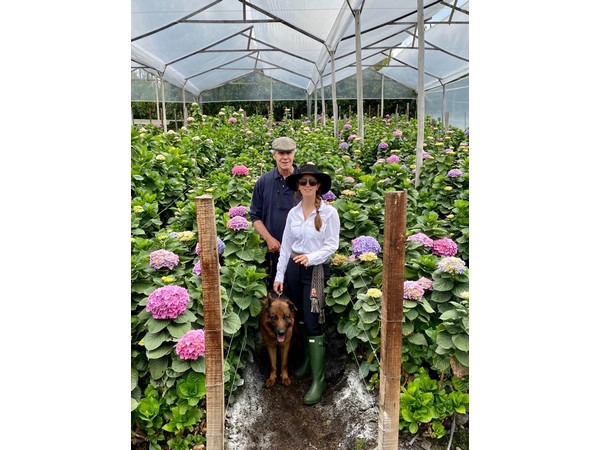
Carnations and cut flower production. A story that tracks back to its roots
Flores La Conchita used to be a carnation grower in the past. "Actually, the first flowers we exported 55 years ago were carnations". After a break and focusing on other crops, the company decided to start again with a new carnation program for the Korean and Japanese markets.
"The carnation program is going to open the Asian market for us because carnations are the most popular flower in these markets. For example, in the case of the Japanese market, they produce 80% of what they consume from national production and only import 20% from abroad. Carnations are the exception since almost all of it is imported, and it is imported all year round."
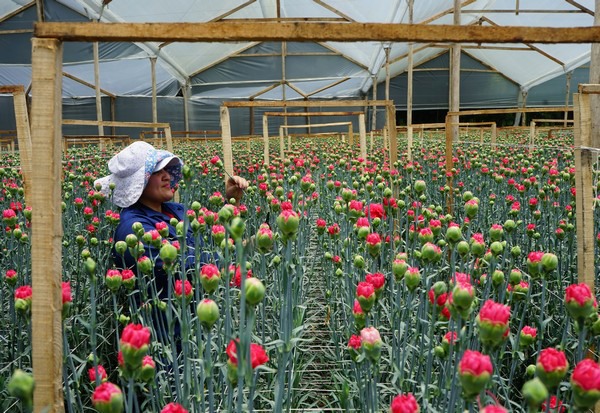
Roses for the local market
Even before the Flores La Conchita was officially founded, they were already growing roses for their local points of sale, named Rosas Don Eloy, since 1959. "It's a unique luxury brand that sells only roses. Due to its long history and high quality, many Colombian have fond memories of when they bought or received our roses for a special event. I say it is unique because there must be very few florist shops that have their own farm catering specifically to them and controlling their cold chain themselves. We are able to hydrate our roses every step of the way, from the moment they are cut, to when they reach customers." Today, Rosas Don Eloy has 11 points of sale in 3 cities in Colombia.
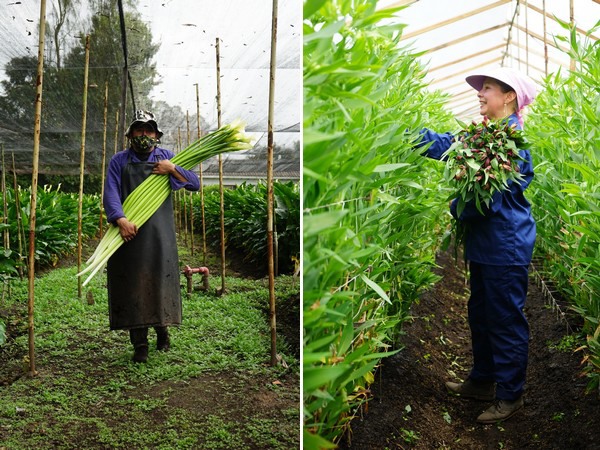
The US market and the recession
Flores la Conchita's main market is the US, where 50% of its sales go. "If what they're predicting right now is a soft-landing recession, it will obviously be felt by everyone, but if you're a boutique farm that works with quality and high-end florists, I think those are not going be hit as hard as supermarket sales, where people have a budget for food and other purchases, and if everything goes up, flowers will be taken off their list. Inflation hits everyone, but it hits people's pockets differently.
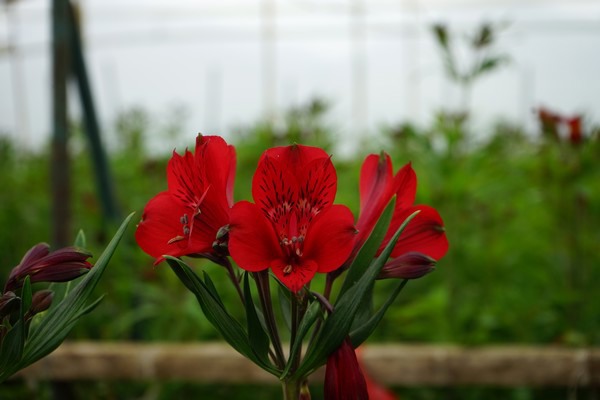
Challenges and new solutions
"Speaking of challenges, this year alone, four major events required to be analyzed and acted upon swiftly. Namely, the Russia-Ukraine crisis that completely erased trade with one of our main export destinations; a rapid change in the availability and prices of our supplies such as fertilizers, cardboard, rice husk, etc.; a broad and daily change in exchange rates that make negotiating with 180 customers worldwide even more challenging; and finally, a high rotation rate in operational staff."
"One of the biggest challenges that Colombia, and the world, are facing is high personnel rotation rates. Younger generations don't tend to stay in their jobs as long as previous generations, and that obviously affects the company because you invest in training without getting the expected returns. Compounding the effect of young generations' high rotation, farms in Colombia have been growing at a faster pace than usual, so the demand for workers is very high. We have worked on implementing different strategies at the farm to retain people, and one of them is to dance. I always say we don't stretch, we dance. We are a dancing farm. There are Zumba programs in the afternoon for anyone who wants to take them and a dance-off competition during our end-of-the-year festivities."
To be able to face all these challenges and opportunities, de Germán-Ribon has implemented a thorough data recording of every part, process, and step in the business to give the company prompt information. "From improving traditional metrics such as production where you can know which person is responsible for cutting a particular stem, to measuring employees' happiness as it is directly linked to output, quality, and rotation. To start gathering the needed data, I relied on "godfathers to the process" or impartial onlookers, who are able to be critical of the process as they collect data and thus are able to improve them as well. Once you gather information, you establish KPIs that help you determine how the shifting variables are affecting your business. These metrics are key to business decisions. The faster you can make accurate decisions in a fast-paced world where businesses have to keep up and adapt rapidly, the better. Business, as usual, is no longer possible."
Germán-Ribón is also part of the Asocolflores – The Association of Colombian Flower Exporters - board, and together with the members, they cooperate to overcome the big challenges ahead. "We have to work together."
For more information
Flores La Conchita
Tatiana de Germán-Ribón
Email: [email protected]
www.floreslaconchita.com
